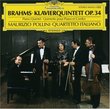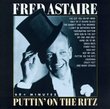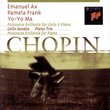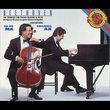| All Artists: Bedrich Smetana, Antoni Wit, Polish National Radio Symphony Orchestra Title: Smetana: M� Vlast Members Wishing: 0 Total Copies: 0 Label: Naxos Release Date: 11/29/1994 Genre: Classical Styles: Forms & Genres, Theatrical, Incidental & Program Music Number of Discs: 1 SwapaCD Credits: 1 UPC: 730099593120 |
Search - Bedrich Smetana, Antoni Wit, Polish National Radio Symphony Orchestra :: Smetana: M� Vlast
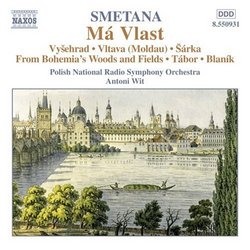 | Bedrich Smetana, Antoni Wit, Polish National Radio Symphony Orchestra Smetana: M� Vlast Genre: Classical
|
Larger Image |
CD DetailsSimilarly Requested CDs
|
CD ReviewsWonderful tour of Smetana's music and the Czech countryside B. G. Reinhart | 02/24/1999 (4 out of 5 stars) "For years I have been trying to find a recording of the Moldau (Vltava) which I fell in love with as a teenager. I found this CD recently with a special sale price in a local store. I was delighted that it was presented by an Eastern European Symphony -- we don't hear much of them in the west -- and I hoped they would have a special feeling for Smetana's vibrant romance with his Czech homeland. They do and they capture all of his wonderful sense of melody and flow. The other musical poems in the set were new to me. It was nice to finally have the context for the Moldau that Smetana intended." A real classic recording B. G. Reinhart | Houston, TX | 09/05/2007 (5 out of 5 stars) "Little-known but always-reliable conductor Antoni Wit and his Polish Radio Orchestra turn in a classic performance of Smetana's Ma Vlast. It has everything the other great performances have in spades - beauty, drama, superb playing, and a rich atmosphere - but it also has a fantasy-like quality that few other recordings capture. This is one of the slowest, longest performances on disc, not because Wit plods along, but because he generates a sound-world of his own, almost like a giant fantasia. The result is that, as Gramophone magazine notes in its review, it FEELS shorter than most performances! "Ma Vlast" begins with the sounds of medieval Bohemian bard Lumir strumming his harp, passing through the history of the Old Castle, Vysehrad, following the River Vltava (Moldau) (in a gorgeous, expansive performance), through a luminous tour of the Bohemian countryside. If you've never heard this music before, you're in for a delight; this is a beautiful work, 80 minutes of evocative imagery and Czech folk rhythms. If you have already heard some of the grand old recordings of "Ma Vlast" - like Talich and Ancerl's readings on Supraphon or any of the three by Rafael Kubelik - consider investing in this one, too. It presents a unique view of the work that places more emphasis on lyricism and fantasy, and less on drama and (in the first and last movements) battle. The Polish National Radio Symphony Orchestra is clearly world-class, and the recorded sound is natural and resonant in a way that enhances the music's atmosphere greatly. This is one of the best recordings of Bedrich Smetana's masterwork, and it certainly is the best-sounding (all digital) and probably the cheapest, too! Add in the helpful booklet notes and it becomes clear that sometimes, lucky, lucky times, you get far more than you paid for. P.S. Those wishing for more from conductor Antoni Wit would do well to seek out his other critically acclaimed recordings, including a benchmark performance of Mahler's Eighth, two lovely Dvorak CDs, and a great deal of superb Polish music by the likes of Wieniawski, Penderecki, and Gorecki." HOMELAND SECURITY DAVID BRYSON | Glossop Derbyshire England | 01/25/2009 (5 out of 5 stars) "As good a way to judge a disc of Ma Vlast as I can think of is how well it manages to sustain my interest through all six tone-poems played without intermission. I have now undergone the experience twice, and that in close succession because I had enjoyed the first time through enormously. It comes to all but 80 minutes' playing time, and it was not a moment too long for me, even second time round.
I do not have recent performances in mind to use as comparisons, benchmarks, yardsticks or what have you. Many years ago there were three or four sets of Ma Vlast directed by Kubelik, and not surprisingly they were widely taken as a standard. My memory of them is fading, indeed well faded, but the impression that remains with me is that the tempi were in general faster than Wit's tempi here. I like Wit's tempi. There is plenty of energy when it is called for, notably in the fierce Sarka and in the nationalistic final Blanik. However the overall impact is of a relaxed direction giving this relaxed and most beautiful and attractive music time to breathe. Wit seems to understand the Bohemian idiom thoroughly, so far as I from out the northern island can judge of such a matter. The music never sags at any point, even in one very dreamy sequence indeed in Vltava. Most impressive of all from my point of view was that the two final pieces, expressing Hussite themes and added later to the original suite of four, kept my attention effortlessly despite being, I guess, a little less inspired than their predecessors. The whole suite evokes love of homeland and the intense joy of just being there, but the secure and unquestioning aspects of that are probably more musical and poetic than the more assertively nationalistic ones. The recordings date from as far back as 1993 and 1994, and this surprised me because the tone would be very passable by 21st century standards. Insofar as I can detect any difference in quality, it is probably in favour of the earlier takes, the first two tracks consisting of Vysehrad and Vltava. This allows us to hear some particularly beautiful harp sound right at the start, and a truly lovely effect in the quiet stretch of Vltava that I mentioned just above. In fact the orchestral tone is as beautiful as it needs to be throughout, and the Polish National Radio Symphony can take pride in what it has done here. This is not music to be agonised over but music to be enjoyed in a straightforward way. When I bought the set I had a rough but adequate idea of what I was looking for out of it, and I am in no doubt at all that I have got that. If you need comparative assessments then this is the furthest I can take you. For what it may be worth, I would say don't waste this short life stressing over earnest comparisons where this music is concerned. I think you can safely take a short cut, and I think you will not regret acquiring this set, especially at this Naxos price." |

 Track Listings (6) - Disc #1
Track Listings (6) - Disc #1